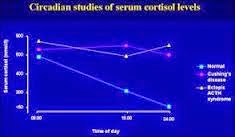What ARE you talking about, Robin? I can hear it now. Yes, we hear a lot about cortisol and how lowering it by lowering stress can affect our weight. I'm sure you've seen the ads for the cortisol-slimming drugs/herbs, too. And we are talking about the same hormone. What is cortisol, anyway?
Cortisol is a corticosteroid hormone produced by the adrenal cortex, the outer layer of the adrenal glands which are essentially lying on top of the kidneys. Without it we die. It is the hormone that responds to "stress", both good and bad. It affects levels of multiple other hormones and electrolytes, which is another topic for another day. However, the short of it is, it is very important in the homeostasis of the body.
When the body is functioning normally, cortisol is regulated by the pituitary in a negative feedback loop with ACTH (adrenocorticotropic hormone). Basically, the pituitary produces ACTH when the body's cortisol level is low, which stimulates the adrenals to produce cortisol. ACTH is pulsatile, which means it is produced in spurts instead of evenly or consistently.
What does all this have to do with cortisol being a night owl?
In a "normal" person, cortisol is the highest around 8 a.m. and decreases to about half that value around 4 p.m. By midnight (give or take an hour each way), cortisol should be about zero or close to it with blood and salivary levels. This is a normal diurnal variation. It is also called the circadian rhythm.
When one has Cushing's, this circadian rhythm is lost, and the normal diurnal variation changes. Cushing's patients have "flat" diurnal levels of cortisol, or even higher levels at night instead of in the morning.Endotext.com explains it really well. Their diagram shows the difference between normal serum cortisol levels and the levels for those who have Cushing's. (Click on the link or the picture to see it better.)
Where does that take us? Well, to testing. Because of this change from normal to warped diurnal rhythm (or lack of), testing cortisol levels can be very useful when diagnosing Cushing's Syndrome/Disease.
The article, "Cushing's Syndrome" by John Newell-Price, Xavier Bertagna, Ashley B Grossman, Lynnette K Nieman, Lancet 2006; 367: 1605–17,Division of Clinical Sciences, University of Sheffi eld, Northern General Hospital, Sheffi eld, UK (J Newell-Price FRCP); says:
Midnight plasma cortisol or late-night salivary cortisol: Normal circadian rhythm of cortisol secretion is lost in patients with Cushing’s syndrome. A single sleeping midnight plasma cortisol concentration of less than 50 nmol/L effectively excludes Cushing’s syndrome at the time of the test and this might be especially helpful in patients in whom there has been incomplete suppression on dexamethasone testing. Concentrations of more than 50 nmol/L are noted in individuals with Cushing’s syndrome, even those who suppress serum cortisol on low-dose dexamethasone testing,96 but this cutoff lacks specificity because patients with acute illness also have values above this concentration. An awake midnight concentration of cortisol in plasma of more than 207 nmol/L diff erentiates between Cushing’s syndrome and other causes of hypercortisolaemia but can miss mild disease diagnosis in about 7% of cases. (The conversion factor of ug/dL x 27.6 = nmol/L)
So, being a night owl doesn't make you "Cushie", but if you are Cushie, you probably are a night owl. Of course, that brings us to yet another topic for another day....cyclical/intermittent/episodic Cushing's.
Cortisol whoooooooooooooooooooooooooooo.........???


Robin,
ReplyDeleteThank you for this information. I found it very informative.
Cyndie